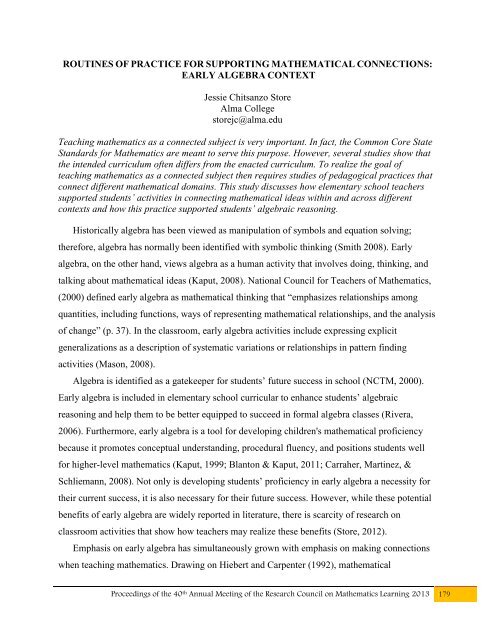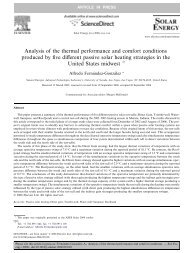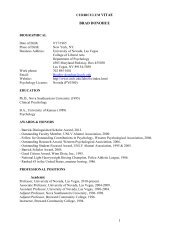2013 Conference Proceedings - University of Nevada, Las Vegas
2013 Conference Proceedings - University of Nevada, Las Vegas
2013 Conference Proceedings - University of Nevada, Las Vegas
- No tags were found...
You also want an ePaper? Increase the reach of your titles
YUMPU automatically turns print PDFs into web optimized ePapers that Google loves.
ROUTINES OF PRACTICE FOR SUPPORTING MATHEMATICAL CONNECTIONS:EARLY ALGEBRA CONTEXTJessie Chitsanzo StoreAlma Collegestorejc@alma.eduTeaching mathematics as a connected subject is very important. In fact, the Common Core StateStandards for Mathematics are meant to serve this purpose. However, several studies show thatthe intended curriculum <strong>of</strong>ten differs from the enacted curriculum. To realize the goal <strong>of</strong>teaching mathematics as a connected subject then requires studies <strong>of</strong> pedagogical practices thatconnect different mathematical domains. This study discusses how elementary school teacherssupported students’ activities in connecting mathematical ideas within and across differentcontexts and how this practice supported students’ algebraic reasoning.Historically algebra has been viewed as manipulation <strong>of</strong> symbols and equation solving;therefore, algebra has normally been identified with symbolic thinking (Smith 2008). Earlyalgebra, on the other hand, views algebra as a human activity that involves doing, thinking, andtalking about mathematical ideas (Kaput, 2008). National Council for Teachers <strong>of</strong> Mathematics,(2000) defined early algebra as mathematical thinking that “emphasizes relationships amongquantities, including functions, ways <strong>of</strong> representing mathematical relationships, and the analysis<strong>of</strong> change” (p. 37). In the classroom, early algebra activities include expressing explicitgeneralizations as a description <strong>of</strong> systematic variations or relationships in pattern findingactivities (Mason, 2008).Algebra is identified as a gatekeeper for students’ future success in school (NCTM, 2000).Early algebra is included in elementary school curricular to enhance students’ algebraicreasoning and help them to be better equipped to succeed in formal algebra classes (Rivera,2006). Furthermore, early algebra is a tool for developing children's mathematical pr<strong>of</strong>iciencybecause it promotes conceptual understanding, procedural fluency, and positions students wellfor higher-level mathematics (Kaput, 1999; Blanton & Kaput, 2011; Carraher, Martinez, &Schliemann, 2008). Not only is developing students’ pr<strong>of</strong>iciency in early algebra a necessity fortheir current success, it is also necessary for their future success. However, while these potentialbenefits <strong>of</strong> early algebra are widely reported in literature, there is scarcity <strong>of</strong> research onclassroom activities that show how teachers may realize these benefits (Store, 2012).Emphasis on early algebra has simultaneously grown with emphasis on making connectionswhen teaching mathematics. Drawing on Hiebert and Carpenter (1992), mathematical<strong>Proceedings</strong> <strong>of</strong> the 40 th Annual Meeting <strong>of</strong> the Research Council on Mathematics Learning <strong>2013</strong> 179




